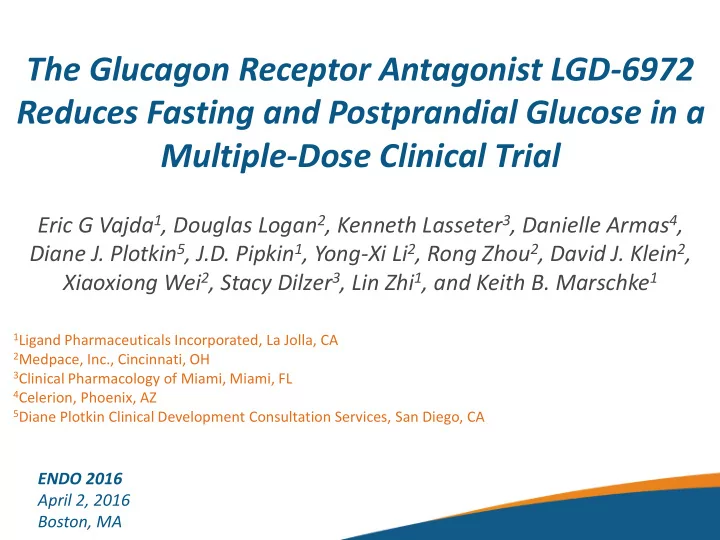

The Glucagon Receptor Antagonist LGD-6972 Reduces Fasting and Postprandial Glucose in a Multiple-Dose Clinical Trial Eric G Vajda 1 , Douglas Logan 2 , Kenneth Lasseter 3 , Danielle Armas 4 , Diane J. Plotkin 5 , J.D. Pipkin 1 , Yong-Xi Li 2 , Rong Zhou 2 , David J. Klein 2 , Xiaoxiong Wei 2 , Stacy Dilzer 3 , Lin Zhi 1 , and Keith B. Marschke 1 1 Ligand Pharmaceuticals Incorporated, La Jolla, CA 2 Medpace, Inc., Cincinnati, OH 3 Clinical Pharmacology of Miami, Miami, FL 4 Celerion, Phoenix, AZ 5 Diane Plotkin Clinical Development Consultation Services, San Diego, CA ENDO 2016 April 2, 2016 Boston, MA
DISCLOSURE EGV, JDP, LZ, and KBM are employees and shareholders of Ligand Pharmaceuticals DL, KL, DA, DJP, YXL, RZ, DJK, XW, and SD were contracted by Ligand Pharmaceuticals to perform the studies described
Background • Excessive hepatic glucose production is a common feature in type 2 diabetes mellitus (T2DM) • Inappropriate elevations in postprandial glucagon concentrations further exacerbate hyperglycemia in T2DM patients • Multiple preclinical models have demonstrated that blockade of the glucagon receptor with antibodies, antisense oligonucleotides, or small molecule glucagon receptor antagonists leads to reductions in plasma glucose 3
LGD-6972: Overview • Orally bioavailable small molecule that potently binds to the glucagon receptor in vitro and competitively antagonizes the actions of glucagon • LGD-6972 reduces plasma glucose in animal models of type 1 and type 2 diabetes 1,2 STZ Injected Mice db/db Mice 1 American Diabetes Association (ADA) 72nd Scientific Sessions; Philadelphia, PA, USA; June 8-12, 2012 2 American Diabetes Association 73rd Scientific Sessions; Chicago, IL; June 21-25, 2013 4
LGD-6972: Clinical Data Positive Phase 1a Clinical Data • Healthy Individuals Type 2 Diabetics Double-blind, placebo- controlled, randomized single ascending oral dose study evaluating safety, tolerability, PK, and PD in healthy individuals and type 2 diabetes subjects • Dose-dependent decreases in fasting plasma glucose after a single dose • Favorable safety profile Vajda, et al., American Diabetes Association 74th Scientific Sessions; San Francisco; June 13-17, 2014 5
Phase 1b Study Design • Phase 1b multiple ascending dose trial in normal healthy volunteers (NHV) and T2DM subjects • Randomized, double-blinded, placebo controlled study conducted at 3 sites • T2DM subjects were on a stable dose of metformin throughout the study • Once daily oral administration for 14 days, evaluated in 4 cohorts: — 15 mg per day in NHV — 5, 10, and 15 mg per day in T2DM subjects • 48 subjects — n = 12 per cohort (9 active + 3 placebo) • Primary Endpoints: Safety and tolerability of LGD-6972 • Secondary Endpoints: Pharmacokinetics and plasma glucose influence 6
Baseline Characteristics and Demographics Healthy Diabetics Volunteers Placebo 15 mg Placebo 5 mg 10 mg 15 mg Number of subjects 3 9 9 9 9 9 Age (years) (%) 47.3 (8.7) 42.3 (10.8) 52.2 (6.2) 55.1 (6.0) 58.9 (6.7) 53.6 (8.7) Female 0 0 6 2 4 5 Gender (n) Male 3 9 3 7 5 4 Hispanic/Latino 1 3 7 5 6 6 Ethnicity (n) Not Hispanic/Latino 2 6 2 4 3 3 White 1 4 8 8 7 6 Race (n) African American 2 5 1 1 2 3 BMI (Kg/m 2 ) (%) 27.4 (1.7) 24.4 (2.9) 31.0 (4.7) 33.6 (4.2) 32.0 (4.9) 31.3 (5.1) Baseline HbA1c (%) Not taken Not taken 8.5 (0.9) 8.2 (0.7) 8.2 (1.1) 8.5 (0.9) 7
Safety and PK • There were no serious adverse events or adverse events that required study discontinuation • LGD-6972 was well tolerated with no clinically significant or dose dependent changes in: — Hematology — Clinical chemistry — Urinalysis — ECG — Vital signs • Adverse events were generally mild to moderate (most common AEs were nausea and headache) • LGD-6972 was well absorbed with a long half life (t ½ ≈50 hours) and steady state PK was achieved within 7-10 days with once daily oral administration 8
LGD-6972 Reduces Fasting Plasma Glucose Normal Healthy Volunteers • LGD-6972 reduces fasting plasma glucose after a single dose and the effect persisted throughout 14-day dosing period 9
LGD-6972 Reduces Fasting Plasma Glucose Type 2 Diabetics • Dose dependent decreases in fasting plasma glucose after treatment for 14 days with LGD-6972 10
Glucose is Reduced Throughout the Day Type 2 Diabetics • 7 point glucose measurements performed on Day -1 and Day 14 • LGD-6972 decreased glucose in both fasting and post-prandial states • 15 mg dose decreased weighted mean glucose by -53 mg/dL; estimated to be approximately 1.5% reduction in HbA1c at steady state 1 11 Rohlfing, et al., Diabetes Care ; 25:2, 275-278, 2002
HbA1c decreased from baseline Type 2 Diabetics • Decreases from baseline in HbA1c were observed for all cohorts after only 14 day treatment • Longer term studies will be needed to determine the magnitude of this effect 12
Hormonal Effects Type 2 Diabetics • LGD-6972 increased plasma glucagon and total GLP-1 13
Oral Glucose Tolerance Test Type 2 Diabetics • 10 mg LGD-6972 increased insulin excursion and decreased glucagon excursion after oral glucose load 14
Summary • In a multiple ascending dose study, LGD-6972 was well tolerated in NHV and T2DM subjects treated for 14 days • LGD-6972 substantially improved glycemic control with a rapid onset of effect in T2DM subjects • Dose dependent decreases in fasting plasma glucose were observed in NHV and T2DM after a single dose and the effects persisted throughout a 14 day dosing period • Glucose reductions were observed in both fasting and postprandial states • In an OGTT, insulin excursion was increased while glucagon excursion decreased • The favorable safety and efficacy profile of LGD-6972 supports further clinical development 15
Recommend
More recommend